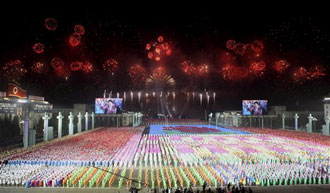North Korea looms larger in humanity’s consciousness than all but a handful of major nations. Why? It’s the ultimate reality show and we are gripped by morbid curiosity as to how long it can last and in what fashion it will all come to an end.
Economically, North Korea is a doomed dwarf. Of the 194 nations on the CIA’s list of nations, North Korea ranks 154th in per capita GDP on a purchasing-power parity (PPP) basis, below the Sudan and Laos. It has virtually no trade other than with China and a few rogue nations who buy its missiles and other armaments. Its best export is high quality counterfeit Benjamins. N. Korea’s 22 million citizens are famous mostly for the many famines they have endured during the 65 years since the Korean peninsula was partitioned North and South.
The stark contrast to its southern neighbor amps up the curiosity factor. South Korea is a prosperous democracy with the world’s slickest transportation system and the fastest internet infrastructure. Its industries dominate in memory chips, LCD panels, cell phones, electric-car batteries and sophisticated cargo ships and tankers. N. Korea, on the other hand, is a madhouse dictatorship that begs aid while spewing threats of mass destruction. Other than a common language the differences are so profound as to suggest centuries of separate evolution. Yet they were a single nation until being partitioned by Truman and Stalin in 1945 as a Cold-War expedient.
Current despot Kim Jong-il assumed the lead role when dad Kim Il-sung died on July 8, 1994. It actually took Jong-il until October 8, 1997 to consolidate enough power to assume the posts of General Secretary of the Workers’ Party of Korea and chairman of the National Defense Commission. That may be why he’s going the extra distance to position his son early for an easier succession.
If the one rule of this reality show is that personal power must be exercised within the context and structure of a Soviet-style communist regime, its object is to enjoy as unconscionably extravagant a lifestyle as you can manage while subjecting your people to privation to the limits of human endurance. You get extra points for getting your long-suffering citizens to put on mass spectacles so well practiced that they come off with the precision of Swiss clockwork.
So far Kim Jong-il has racked up an astronomical score as an over-the-top tyrant, what with two lavish mansions in Pyongyang and 10 chalets across North Korea. One of Kim’s more picturesque pads is a seven-story ocean tower in South Hamgyong Province with three underwater floors. When he isn’t lounging in an underwater viewing room, he’s boarding in an indoor wave pool with a young female doctor and nurse. Those retreats from the rigors of ruling are on top of the half dozen country estates built by his father. Adding to the fantastic quality of this extravagance is the underground rail lines that link these estates to ensure privacy of his comings and goings from prying U.S. spy satellites.
The world doesn’t begrudge a B-movie despot like Kim the all-night bacchanals in the company of scantily clad young women swilling buckets of Hennessy cognac. But some of his half-starving countrymen might. And that’s the ultimate fascination of this grand-scale reality show: how and when the more courageous of his countrymen will rise up to put a merciful end to the world’s longest-running political farce.

